Apprenticeships will have a minimum price tag attached to them for the first time after the apprenticeship levy is introduced, FE Week can reveal.
A Department for Business, Innovation and Skills official told delegates at a Capita conference on apprenticeships and traineeships, in Manchester, that the current funding caps would be replaced with new upper and lower limits from next April.
The news has been welcomed by Association of Employment and Learning Providers chief executive Mark Dawe, who had previously called for a price “floor” and warned of a race to the bottom price war without one.
Slides from the presentation by Helen Gorner, head of apprenticeship policy at BIS, referred to “funding bands”, which “set the ranges in which government expects the cost of training and assessment for apprenticeship to fall”.
The bands will “limit the amount of levy funds an employer can spend on training for an individual apprentice” and “vary according to the level and type of apprenticeship”.
Ms Gorner gave an example of a butcher apprenticeship standard, in band three, which would have an upper limit of £6,000 and a lower limit of £3,000.
Mr Dawe told FE Week that the introduction of a “funding range with a top and a bottom” was a “very welcome development”.
He said: “Without a floor under the cap, there would be a danger of cases arising of downward bidding between providers to try and win new business.”
And he warned that unchecked negotiation between employers and providers “could impact adversely on the quality of delivery”.
Current Trailblazer funding arrangements refer to maximum contributions – or caps – but do not include minimum costs.
Each apprenticeship standard currently has a funding cap which represents the maximum cost for delivering the standard.
There are five such caps – rising to six in 2016/17 – which range from £3,000 and £27,000.
Each cap includes a core government contribution as well as an employer contribution.
Under current funding rules, the butcher apprenticeship standard referred to by Ms Gorner attracted a maximum government contribution of £6,000, with an expected employer contribution of £3,000 – but no minimum cost is given.
Mr Dawe had previously called for the introduction of a lower price limit for apprenticeship standards during an evidence session for a parliamentary inquiry in apprenticeships on June 8.
He told MPs on the Education, Skills and the Economy sub-committee that AELP had concerns around the impact on quality if no such limit was introduced.
He warned of “unscrupulous providers” who would offer deals such as “two for one”.
Mr Dawe said AELP would prefer set rates, “so you just agree what you’re going to do for a set rate” but “if there’s going to be a cap then we think there should be a base, a floor as well”.
Further detail on the provisional funding bands for each apprenticeship was due to have been published by BIS in June.
But Skills Minister Nick Boles told delegates at last month’s AELP conference that it would be a “little delayed” following the outcome of the EU referendum vote on June 23.
He added: “We still expect to get that information out well before the summer break.”








Just to be clear, the caps do NOT represent “the maximum cost for delivering the standard”. Caps are about the maximum contribution which can come *from the Levy pot*. There is nothing to stop employers going beyond that from their own resources. The Government is subsidising apprenticeships, not paying for everything.